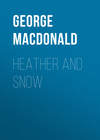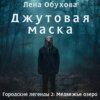Kitobni o'qish: «Heather and Snow», sahifa 2
She glanced up at him.
'Weel ye hae that!' she answered, with a smile that showed her lovely white teeth: 'ye're a' dubs (all bemired)! What for sud ye be in sic a hurry? Ye saw me no three days gane!'
'Ay, I saw ye, it's true; but I didna get a word o' ye!'
'Ye was free to say what ye likit. There was nane by but my mither!'
'Wud ye hae me say a'thing afore yer mither jist as I wud til ye yer lane (alone)?' he asked.
Ay wud I,' she returned. 'Syne she wad ken, 'ithoot my haein to tell her sic a guse as ye was!'
Had he not seen the sunny smile that accompanied her words he might well have taken offence.
'I wuss ye war anither sic-like!' he answered simply.
'Syne there wud be twa o' 's!' she returned, leaving him to interpret.
Silence again fell.
'Weel, what wud ye hae, Francie?' said Kirsty at length.
'I wud hae ye promise to merry me, Kirsty, come the time,' he answered; 'and that ye ken as well as I du mysel!'
'That's straucht oot ony gait!' rejoined Kirsty. 'But ye see, Francie,' she went on, 'yer father, whan he left ye a kin' o' a legacy, as ye may ca' 't, to mine, hed no intention that I was to be left oot; neither had my father whan he acceppit o' 't!'
'I dinna unerstan ye ae styme (one atom)!' interrupted Gordon.
'Haud yer tongue and hearken,' returned Kirsty. 'What I'm meanin 's this: what lies to my father's han' lies to mine as weel; and I'll never hae 't kenned or said that, whan my father pu't (pulled) ae gait, I pu't anither!'
'Sakes, lassie! what are ye haverin at? Wud it be pu'in agen yer father to merry me?'
'It wud be that.'
'I dinna see hoo ye can mak it oot! I dinna see hoo, bein sic a freen' o' my father's, he sud objeck to my father's son!'
'Eh, but laddies ir gowks!' cried Kirsty. 'My father was your father's freen' for his sake, no for his ain! He thinks o' what wud be guid for you, no for himsel!'
'Weel, but,' persisted Gordon, 'it wud be mair for my guid nor onything ither he cud wuss for, to hae you for my wife!'
Kirsty's nostrils began to quiver, and her lip rose in a curve of scorn.
'A bonnie wife ye wud hae, Francie Gordon, wha, kennin her father duin ilk mortal thing for the love o' his auld maister and comrade, tuik the fine chance to mak her ain o' 't, and haud her grip o' the callan til hersel!—Think ye aither o' the auld men ever mintit at sic a thing as fatherin baith? That my father had a lass-bairn o' 's ain shawed mair nor onything the trust your father pat in 'im! Francie, the verra grave wud cast me oot for shame 'at I sud ance hae thoucht o' sic a thing! Man, it wud maist drive yer leddy-mither dementit!'
'It's my business' Kirsty, wha I merry!'
'And I houp yer grace 'll alloo it's pairt my business wha ye sail not merry—and that's me, Francie!'
Gordon sprang to his feet with such a look of wrath and despair as for a moment frightened Kirsty who was not easily frightened. She thought of the terrible bog-holes on the way her lover had come, sprang also to her feet, and caught him by the arm where, his foot already in the stirrup, he stood in the act of mounting.
'Francie! Francie!' she cried, 'hearken to rizzon! There's no a body, man or wuman, I like better nor yersel to du ye ony guid or turn o' guid—'cep' my father, of coorse, and my mither, and my ain Steenie!'
'And hoo mony mair, gien I had the wull to hear the lang bible-chapter o' them, and see mysel comin in at the tail o' them a', like the hin'most sheep, takin his bite as he cam? Na, na! it's time I was hame, and had my slip (pinafore) on, and was astride o' a stick! Gien ye had a score o' idiot-brithers, ye wud care mair for ilk are o' them nor for me! I canna bide to think o' 't.'
'It's true a' the same, whether ye can bide to think o' 't or no, Francie!' returned the girl, her face, which had been very pale, now rosy with indignation. 'My Steenie's mair to me nor a' the Gordons thegither, Bow-o'-meal or Jock-and-Tam as ye like!'
She drew back, sat down again to the stocking she was knitting for Steenie, and left her lover to mount and ride, which he did without another word.
'There's mair nor ae kin' o' idiot,' she said to herself, 'and Steenie's no the kin' that oucht to be ca'd ane. There's mair in Steenie nor in sax Francie Gordons!'
If ever Kirsty came to love a man, it would be just nothing to her to die for him; but then it never would have been anything to her to die for her father or her mother or Steenie!
Gordon galloped off at a wild pace, as if he would drive his pony straight athwart the terrible moss, taking hag and well-eye as it came. But glancing behind and seeing that Kirsty was not looking after him, he turned the creature's head in a safer direction, and left the moss at his back.
CHAPTER IV
DOG-STEENIE
She sat for some time at the foot of the hill, motionless as itself, save for her hands. The sun shone on in silence, and the blue butterflies which haunted the little bush of bluebells, that is harebells, beside her, made no noise; only a stray bee, happy in the pale heat, made a little music to please itself—and perhaps the butterflies. Kirsty had an unusual power of sitting still, even with nothing for her hands to do. On the present occasion, however, her hands and fingers went faster than usual—not entirely from eagerness to finish her stocking, but partly from her displeasure with Francis. At last she broke her 'worset,' drew the end of it through the final loop, and, drawing it, rose and scanned the side of the hill. Not far off she spied the fleecy backs of a few feeding sheep, and straightway sent out on the still air a sweet, strong, musical cry. It was instantly responded to by a bark from somewhere up the hill. She sat down, clasped her hands over her knees, and waited.
She had not to wait long. A sound of rushing came through the heather, and in a moment or two, a fine collie, with long, silky, wavy coat of black and brown, and one white spot on his face, shot out of the heather, sprang upon her, and, setting his paws on her shoulders, began licking her face. She threw her arms round him, and addressed him in words of fondling rebuke:—
'Ye ill-mennered tyke!' she said; 'what richt hae ye to tak the place o' yer betters? Gang awa doon wi' ye, and wait. What for sud ye tak advantage o' your fower legs to his twa, and him the maister o' ye! But, eh man, ye're a fine doggie, and I canna bide the thoucht 'at yer langest day maun be sae short, and tak ye awa hame sae lang afore the lave o' 's!'
While she scolded, she let him caress her as he pleased. Presently he left her, and going a yard or two away, threw himself on the grass with such abandon as no animal but a weary dog seems capable of reaching. He had made haste to be first that he might caress her before his master came; now he heard him close behind, and knew his opportunity over.
Stephen came next out of the heather, creeping to Kirsty's feet on all-fours. He was a gaunt, longbacked lad, who, at certain seasons undetermined, either imagined himself the animal he imitated, or had some notion of being required, or, possibly, compelled to behave like a dog. When the fit was upon him, all the day long he would speak no word even to his sister, would only bark or give a low growl like the collie. In this last he succeeded much better than in running like him, although, indeed, his arms were so long that it was comparatively easy for him to use them as forelegs. He let his head hang low as he went, throwing it up to bark, and sinking it yet lower when he growled, which was seldom, and to those that loved him indicated great trouble. He did not like Snootie raise himself on his hindlegs to caress his sister, but gently subsided upon her feet, and there lay panting, his face to the earth, and his fore-arms crossed beneath his nose.
Kirsty stooped, and stroked and patted him as if he were the dog he seemed fain to be. Then drawing her feet from under him, she rose, and going a little way up the hill to the hut, returned presently with a basin full of rich-looking milk, and a quarter of thick oat-cake, which she had brought from home in the morning. The milk she set beside her as she resumed her seat. Then she put her feet again under the would-be dog, and proceeded to break small pieces from the oat-cake and throw them to him. He sought every piece eagerly as it fell, but with his mouth only, never moving either hand, and seemed to eat it with a satisfaction worthy of his simulated nature. When the oat-cake was gone, she set the bowl before him, and he drank the milk with care and neatness, never putting a hand to steady it.
'Now you must have a sleep, Steenie!' said his sister.
She rose, and he crawled slowly after her up the hill on his hands and knees. All the time he kept his face down, and, his head hanging toward the earth, his long hair hid it quite. He strongly suggested a great Skye-terrier.
When they reached the hut, Kirsty went in, and Steenie crept after her. They had covered the floor of it with heather, the stalks set upright and close packed, so that, even where the bells were worn off, it still made a thick long-piled carpet, elastic and warm. When the door was shut, they were snug there even in winter.
Inside, the hut was about six feet long, and four wide. Its furniture was a little deal table and one low chair. In the turf of which the wall consisted, at the farther end from the door, Kirsty had cut out a small oblong recess to serve as a shelf for her books. The hut was indeed her library, for in that bole stood, upright with its back to the room, in proper and tidy fashion, almost every book she could call her own. They were about a dozen, several with but one board and some with no title, one or two very old, and all well used. Most of her time there, when she was not knitting, Kirsty spent in reading and thinking about what she read; many a minute, even when she was knitting, she managed to read as well. She had read two of sir Walter's novels, and several of the Ettrick-shepherd's shorter tales, which the schoolmaster had lent her; but on her shelf and often in her hands were a Shakspere, a Milton, and a translation of Klopstock's Messiah—which she liked far better than the Paradise Lost, though she did not admire it nearly so much. Of the latter she would say, 'It's unco gran', but it never maks my hert grit (great), meaning that it never caused her any emotion. Among her treasures was also a curious old book of ghost-stories, concerning which the sole remark she was ever heard to make was, that she would like to know whether they were true: she thought Steenie could tell, but she would not question him about them. Ramsay's Gentle Shepherd was there too, which she liked for the good sense in it. There was a thumbed edition of Burns also, but I do not think much of the thumbing was Kirsty's, though she had several of his best poems by heart.
Between the ages of ten and fifteen, Kirsty had gone to the parish school of the nearest town: it looked a village, but they always called it the town. There a sister of her father lived, and with her she was welcome to spend the night, so that she was able to go in most weathers. But when she staid there, her evening was mostly spent at the schoolmaster's.
Mr. Craig was an elderly man, who had married late, and lost his wife early. She had left him one child, a delicate, dainty, golden-haired thing, considerably younger than Kirsty, who cherished for her a love and protection quite maternal. Kirsty was one of the born mothers, who are not only of the salt, but are the sugar and shelter of the world. I doubt if little Phemie would have learned anything but for Kirsty. Not to the day of her death did her father see in her anything but the little girl his wife had left him. He spoiled her a good deal, nor ever set himself to instruct her, leaving it apparently to the tendency of things to make of her a woman like her mother.
He was a real student and excellent teacher. When first he came as schoolmaster to Tiltowie, he was a divinity student, but a man so far of thought original that he saw lions in the way of becoming a minister. Such men as would be servants of the church before they are slaves of the church's Master will never be troubled with Mr. Craig's difficulties. For one thing, his strong poetic nature made it impossible for him to believe in a dull, prosaic God: when told that God's thoughts are not as our thoughts, he found himself unable to imagine them inferior to ours. The natural result was that he remained a schoolmaster—to the advantage of many a pupil, and very greatly to the advantage of Kirsty, whose nature was peculiarly open to his influences. The dominie said he had never had a pupil that gave him such satisfaction as Kirsty; she seemed to anticipate and catch at everything he wanted to make hers. There was no knowledge, he declared, that he could offer her, which the lassie from Corbyknowe would not take in like her porridge. Best thing of all for her was that, following his own predilections, he paid far more attention, in his class for English, to poetry than to prose. Colin Craig was himself no indifferent poet, and was even a master of the more recondite forms of verse. If, in some measure led astray by the merit of the form, he was capable of admiring verse essentially inferior, he yet certainly admired the better poetry more. He had, besides, the faculty of perceiving whether what he had written would or would not convey his thought—a faculty in which even a great poet may be deficient.
In a word, Kirsty learned everything Mr. Craig brought within her reach; and long after she left school, the Saturday on which she did not go to see him was a day of disappointment both to the dominie and to his little Phemie.
When she had once begun to follow a thing, Kirsty would never leave the trail of it. Her chief business as well as delight was to look after Steenie, but perfect attention to him left her large opportunity of pursuing her studies, especially at such seasons in which his peculiar affection, whatever it really was, required hours of untimely sleep. For, although at all times he wandered at his will without her, he invariably wanted to be near her when he slept; while she, satisfied that so he slept better, had not once at such a time left him. During summer, and as long before and after as the temperature permitted, the hut was the place he preferred when his necessity was upon him; and it was Kirsty's especial delight to sit in it on a warm day, the door open and her brother asleep on her feet, reading and reading while the sun went down the sky, to fill the hut as he set with a glory of promise; after which came the long gloamin, like a life out of which the light but not the love has vanished, in which she neither worked nor read, but brooded over many things.
Leaving the door open behind them, Kirsty took a book from the bole, and seated herself on the low chair; instantly Steenie, who had waited motionless until she was settled, threw himself across her feet on the carpet of heather, and in a moment was fast asleep.
There they remained, the one reading, the other sleeping, while the hours of the warm summer afternoon slipped away, ripples on the ocean of the lovely, changeless eternity, the consciousness of God. For a time the watching sister was absorbed in King Lear; then she fell to wondering whether Cordelia was not unkindly stiff toward her old father, but perceived at length that, with such sisters listening, she could not have spoken otherwise. Then she wondered whether there could be women so bad as Goneril and Regan, concluding that Shakspere must know better than she. At last she drew her bare feet from under Steenie, and put them on his back, where the coolness was delightful. Then first she became aware that the sun was down and the gloamin come, and that the whole world must be feeling just like her feet. The long clear twilight, which would last till morning, was about her, the eerie sleeping day, when the lovely ghosts come out of their graves in the long grass, and walk about in the cool world, with little ghosty sighs at sight of the old places, and fancy they are dreaming. Kirsty was always willing to believe in ghosts: awake in the dark nights she did not; but in her twilight reveries she grew very nearly a ghost herself.
It was a wonder she could sit so long and not feel worn out; but Kirsty was exceptionally strong, in absolute health, and specially gifted with patience. She had so early entertained and so firmly grasped the idea that she was sent into the world expressly to take care of Steenie, that devotion to him had grown into a happy habit with her. The waking mind gave itself up to the sleeping, the orderly to the troubled brain, the true heart to the heart as true.
CHAPTER V
COLONEL AND SERGEANT
There was no difference of feeling betwixt the father and mother in regard to this devotion of Kirsty's very being to her Steenie; but the mother in especial was content with it, for while Kirsty was the apple of her eye, Steenie was her one loved anxiety.
David Barclay, a humble unit in the widespread and distinguished family of the Barclays or Berkeleys, was born, like his father and grandfather and many more of his ancestors, on the same farm he now occupied. While his father was yet alive, with an elder son to succeed him, David listed—mainly from a strong desire to be near a school-friend, then an ensign in the service of the East India Company. Throughout their following military career they were in the same regiment, the one rising to be colonel, the other sergeant-major. All the time, the schoolboy-attachment went on deepening in the men; and, all the time, was never man more respectfully obedient to orders than David Barclay to those of the superior officer with whom in private he was on terms of intimacy. As often as they could without attracting notice, the comrades threw aside all distinction of rank, and were again the Archie Gordon and Davie Barclay of old school-days—as real to them still as those of the hardest battles they had fought together. In more primitive Scotland, such relations are, or were more possible than in countries where more divergent habits of life occasion wider social separations; and then these were sober-minded men, who neither made much of the shows of the world, nor were greedy after distinction, which is the mere coffin wherein Duty-done lies buried.
When they returned to their country, both somewhat disabled, the one retired to his inherited estate, the other to the family farm upon that estate, where his brother had died shortly before; so that Archie was now Davie's landlord. But no new relation would ever destroy the friendship which school had made close, and war had welded. Almost every week the friends met and spent the evening together—much oftener, by and by, at Corbyknowe than at Castle Weelset. For both married soon after their return, and their wives were of different natures.
'My colonel has the glory,' Barclay said once, and but once, to his sister, 'but, puir fallow, I hae the wife!' And truly the wife at the farm had in her material enough, both moral and intellectual, for ten ladies better than the wife at the castle.
David's wife brought him a son the first year of their marriage, and the next year came a son to the colonel and a daughter to the sergeant. One night, as the two fathers sat together at the farm, some twelve hours after the birth of David's girl, they mutually promised that the survivor would do his best for the child of the other. Before he died the colonel would gladly have taken his boy from his wife and given him to his old comrade.
As to Steenie, the elder of David's children, he was yet unborn when his father, partly in consequence of a wound from which he never quite recovered, met with rather a serious accident through a young horse in the harvest-field, and the report reached his wife that he was killed. To the shock she thus received was generally attributed the peculiarity of the child, prematurely born within a month after. He had long passed the age at which children usually begin to walk, before he would even attempt to stand, but he had grown capable of a speed on all-fours that was astonishing. When at last he did walk, it was for more than two years with the air of one who had learned a trick; and throughout his childhood and a great part of his boyhood, he continued to go on all-fours rather than on his feet.










